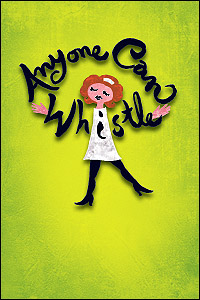
*
If all the people who claimed to have seen the original production of Anyone Can Whistle had actually seen it, the show would have run for years, instead of the nine performances it managed to eke out over on West 44th Street. I'm different from all of those people—I actually did see it, on the evening of April 11, 1964, and I have the Playbill to prove it. I was 15 years old and no expert, heaven knows, but it was the most startling evening of musical theater I had ever encountered. To explain why, it’s important to understand the context in which this unique, noisy, dancey, irreverent and chaotic experimental satire was born, lived and died—all in a week and a day.
In the spring of 1964 America was an emotional basket case. The previous November, President Kennedy had been assassinated. No one knew it yet, but the fault lines that would tear the country asunder at the end of the decade were already there, cracking just beneath the surface. We were trying to pull ourselves together after a cataclysmic national tragedy; instead, history was pulling us apart. There had been race riots in Birmingham, AL, a couple of months before JFK's death. And by April the new president, LBJ, had ordered a massive buildup of air power over Vietnam. The Beatles were in town, and perfectly innocent-looking high school students were beginning to let their hair grow and wondering where you could find actual marijuana. Surely there was trouble ahead.
| |
 |
|
| Jack Viertel |
Dylan—who often displayed a rueful and ironic sense of humor—was just angry this time out. Racism, war, lockstep middle-American conformity and the generation gap had really riled him. Dolly, on the other hand, just wanted to delight the tired businessman; she did so with so much style and such good tunes that it seemed she had moved into the St. James Theatre for a permanent stay. Across the street, at the Majestic, was Anyone Can Whistle, glowering brashly. And to me, for a couple of hours anyhow, it seemed as though some ingenious lunatic had arranged a dazzling, shotgun wedding: Dylan and Dolly. And what in the world would their children look like? Dylan's subject matter, Dolly's marabou feathers. Dylan's attitude, Dolly's brass. Dylan's youthful cynicism, Dolly's ageless razzmatazz. Like many forced marriages, this one was hardly destined to endure. The authors of Anyone Can Whistle had no such marriage in mind, of course. Arthur Laurents and Stephen Sondheim were restless experimenters working on mainstream Broadway. They’d already done West Side Story and Gypsy. Sondheim the dazzling lyricist had made his composing debut with A Funny Thing Happened on the Way to the Forum, a strikingly original musical comedy with a score whose inventive irreverence would not be recognized for a decade. Whistle, however, pushed the envelope right over the edge.
Its nutcake plot was an opportunity to take shots at a host of targets that were burning up the younger generation. Its premise—that in repressed, conformist, post-Eisenhower America the truly original people were more likely to be locked in an asylum than running around loose —was a popular myth. And its tone had a lot to do with the new comic spirit of Lenny Bruce and Mort Sahl, not to mention the camp Technicolor personalities of Kay Thompson and Brigitte Bardot. (I was too young to get any of that.) In its own disjointed way, the show wore a fabulous set of stylistic trappings. But at its core, it had two great virtues that have outlasted the fashion of the day, not to mention its own scattershot limitations: a beating heart for those trying to come out and be who they are, and a score of startling originality and self-assurance.
| |
 |
|
| Promotional art for Anyone Can Whistle |
Not entirely surprisingly, the score’s brash originality and freshness were largely lost on the press and the public. (Norman Nadel, critic of the lowly World-Telegram & The Sun, did announce the arrival of a brave new musical voice but he was crying in the wilderness.) The show itself divided the critics, irritating some, amusing others. No one really got what it was. And nobody came. But oh, how it spoke to one 15-year-old!
Even at the time it was clear that this was no ordinary flop. Columbia Records recorded the cast album the Monday after the show closed, and what might have been forever lost was preserved, thanks to the insistence of Columbia’s Goddard Leiberson, who understood that something unique had occurred and needed to be heard. Columbia issued the album in a lavish gatefold cover, with lots of production photos, just as if it had been a big hit.
In the passing decades, Whistle has been much talked about but rarely seen. It is, truth to tell, completely a product of its era, while at the same time being entirely different from any other product of its era. Looking at it today with a sympathetic eye for its grand comic ambition and its utter disregard for the safe way of doing anything, it has a kind of unique charm—the lure of that bad boy your parents warned you away from. That in itself makes it unusual for Broadway—a place better known for its endorsement of the conventional. But it also suggests that Anyone Can Whistle, the natural ancestor of Sondheim’s later works of daring, is also the fairy godmother of other bold and unexpected game changers, from Sideshow and Rent to Spring Awakening, Passing Strange and Fela. Broadway, heaven knows, has changed a lot since 1964. Even Bob Dylan's music had a brief fling at the Brooks Atkinson Theatre. (The show's title? The Times They Are A-Changin'.) On the increasing number of occasions when we look up at a marquee with wonder and realize that virtually anything can now happen on our street, we can, in some small way, thank Anyone Can Whistle. (Jack Viertel is the artistic director of Encores! This piece appears in the April 2010 Playbill for New York City Center. The Encores! concert of Anyone Can Whistle — starring Donna Murphy, Sutton Foster and Raul Esparza — plays New York City Center April 8-11.)










